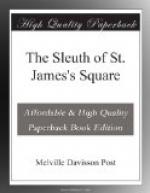The moon came up, a great golden moon, shouldered over the rim of the world by the backs of the crooked elves. The horse and the two persons made a black, distorted shadow that jerked along as though it were a thing evil and persistent. Far off in the thickets of the hills an owl cried, eerie and weird like a creature in some bitter sorrow. The lane was deep with dust. The horse traveled with no sound, and the distorted black shadow followed, now blotted out by the heavy tree tops, and now only partly to be seen, but always there.
My father got down at the door and carried the girl up the steps and between the plaster pillars into the house. There was a hall paneled in white wood and with mahogany doors. He opened one of these doors and went in. The room he entered had been splendid in some ancient time. It was big; the pieces in it were exquisite; great mirrors and old portraits were on the wall.
A man sitting behind a table got up when my father entered. Four tallow candles, in ancient silver sticks, were on the table, and some sheets with figured accounts.
The man who got up was like some strange old child. He wore a number of little capes to hide his humped back, and his body, one thought, under his clothes was strapped together. He got on his feet nimbly like a spider, and they heard the click of a pistol lock as he whipped the weapon out of an open drawer, as though it were a habit thus always to keep a weapon at his hand to make him equal in stature with other men. Then he saw who it was and the double-barreled pistol slipped out of sight. He was startled and apprehensive, but he was not in fear.
He stood motionless behind the table, his head up, his eyes hard, his thin mouth closed like a trap and his long, dead black hair hanging on each side of his lank face over the huge, malformed ears. The man stood thus, unmoving, silent, with his twisted ironical smile, while my father put the girl into a chair and stood up behind it.
“Dillworth,” said my father, “what do you mean by turning this child out of the house?”
The man looked steadily at the two persons before him.
“Pendleton,” he said, and he spoke precisely, “I do not recognize the right of you, or any other man, to call my acts into account; however” — and he made a curious gesture with his extended hands “not at your command, but at my pleasure, I will tell you.
“This young woman had some estate from her mother at that lady’s death. As her guardian I invested it by permission of the court’s decree.” He paused. “When the Maxwell lands were sold before the courthouse I bid them in for my ward. The judge confirmed this use of the guardian funds. It was done upon advice of counsel and within the letter of the law. Now it appears that Maxwell had only a life interest in these lands; Maxwell is dead, and one who has purchased the interest of his heirs sues in the courts for this estate.




